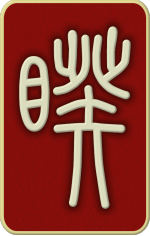
睽 Kuí Opposition (Diversity) [hexagram 38]


Fire over Lake
 Fire element
Fire element
Lunar month: 12 ; Host (controlling) line : 5
The Decision
Opposition, but in small matters success.
In opposition there is fire which tends to rise, while marsh which tends to seep downwards. Two sisters living together with different aspirations. The jubilant clings to the brilliance; the weak advances to the middle place and resonates with the strong. This indicates ‘in small matters success’. Heaven and earth are distinct but together they accomplish the same ends. Male and female are distinct but together they can aspire to the same aims. There is diversity between all beings but they share common aims. Magnificent is the development of diversity and separation.
睽: 小事吉. Kuí: xiǎo shì jí.
彖传: 睽, 火动而上, 泽动而下; 二女同居, 其志不同行; 说而丽乎明, 柔进而上行, 得中而应乎刚; 是以小事吉. 天地睽, 而其事同也; 男女睽, 而其志通也; 万物睽, 而其事类也; 睽之时用大矣哉! Tuàn zhuàn: Kuí, huǒ dòng ér shàng, zé dòng ér xià; èr nǚ tóng jū, qí zhì bù tóng xíng; shuō ér lì hū míng, róu jìn ér shàng xíng, dé zhòng ér yīng hū gāng; shì yǐ xiǎo shì jí. Tiān dìkuí, ér qí shì tóng yě; nán nǚ kuí, ér qí zhì tōng yě; wàn wùkuí, ér qí shì lèi yě; kuí zhī shí yòng dà yǐ zāi!
The Image
Fire above and Marsh below form ‘Diversity’. The wise accordingly accept diversity when aims are shared.
象传: 上火下泽, 睽; 君子以同而异. Xiàng zhuàn: Shàng huǒ xià zé, kuí; jūn zǐ yǐ tóng ér yì.
Line Change 1
Regrets disappear; the lost horse is not pursued as it will return of its own accord. When meeting bad people avoid making mistakes.
‘When meeting bad people’ – guard against misunderstanding.
初九: 悔亡, 丧马勿逐, 自复; 见恶人无咎. Chū jiǔ: huǐ wáng, sàng mǎ wù zhú, zì fù; jiàn è rén wú jiù.
象传: 见恶人, 以辟咎也. Xiàng zhuàn: Jiàn è rén, yǐ bì jiù yě.
Line Change 2
Meeting the boss in an alley. No blame.
‘Meeting the boss in an alley’ – keeping to the proper way.
九二: 遇主于巷, 无咎. Jiǔ èr: yù zhǔ yú xiàng, wú jiù.
象传: 遇主于巷, 未失道也. Xiàng zhuàn: Yù zhǔ yú xiàng, wèi shī dào yě.
Line Change 3
The car is forced backwards, injury and disfigurement. Not a great start but it will come to a good conclusion.
‘The car is forced backwards’ – due to the inappropriate position. ‘Not a good start but it will come to a good conclusion’ – aided by strength.
六三: 见舆曳, 其牛掣, 其人天且劓, 无初有终. Liù sān: xiàn yú yè, qí niú chè, qí rén tiān qiě yì, wú chū yǒu zhōng.
象传: 见舆曳, 位不当也. 无初有终, 遇刚也. Xiàng zhuàn: Jiàn yú yè, wèi bù dàng yě. wú chū yǒu zhōng, yù gāng yě.
Line Change 4
Isolated amongst diverse opinions but finding someone of like mind. There is danger but no fault.
‘Finding someone of like mind. There is no fault’ – the common aim is fulfilled.
九四: 睽孤, 遇元夫, 交孚, 厉无咎. Jiǔ sì: kuí gū, yù yuán fū, jiāo fú, lì wú jiù.
象传: 交孚无咎, 志行也. Xiàng zhuàn: Jiāo fú wú jiù, zhì xíng yě.
Line Change 5
Regrets disappear. An associate clings close like chewing tender meat. With such help going forwards where is the mistake?
‘An associate clings close like chewing tender meat’ – a rewarding advancement.
六五: 悔亡, 厥宗噬肤, 往何咎. Liù wǔ: huǐ wáng, jué zōng shì fū, wǎng hé jiù.
象传: 厥宗噬肤, 往有庆也. Xiàng zhuàn: Jué zōng shì fū, wǎng yǒu qìng yě.
Line Change 6
Isolated amongst diverse opinions. Belief that a pig has been glimpsed covered in mud in a van full of demons. Initially prepare a weapon for defense but think better of it as it not an assailant but a close friend. When go forward, rain falls and soon all will be well.
‘When go forward, rain falls’ – all doubts disappear.
上九: 睽孤, 见豕负涂, 载鬼一车, 先张之弧, 后说之弧, 匪寇婚媾, 往遇雨则吉. Shàng jiǔ: kuí gū, jiàn shǐ fù tú, zài guǐ yī chē, xiān zhāng zhī hú, hòu shuō zhī hú, fěi kòu hūn gòu, wǎng yù yù zé jí?
象传: 遇雨之吉, 群疑亡也. Xiàng zhuàn: Yù yù zhī jí, qún yí wáng yě.
The full set of 64 English translations is available in our new book 'Book of Changes - Deciphered' ➚.